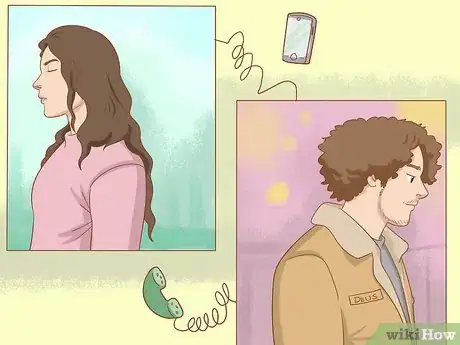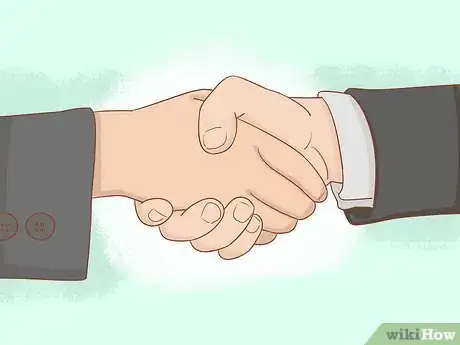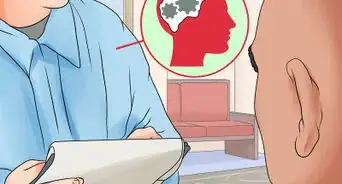This article was co-authored by Rebecca Tenzer, MAT, MA, LCSW, CCTP, CGCS, CCATP, CCFP. Rebecca Tenzer is the owner and head clinician at Astute Counseling Services, a private counseling practice in Chicago, Illinois. With over 18 years of clinical and educational experience in the field of mental health, Rebecca specializes in the treatment of depression, anxiety, panic, trauma, grief, interpersonal relationships using a combination of Cognitive Behavioral therapy, Psychodynamic therapy, and other evidence-based practices. Rebecca holds a Bachelor of Arts (BA) in Sociology and Anthropology from DePauw University, a Master in Teaching (MAT) from Dominican University, and a Master of Social Work (MSW) from the University of Chicago. Rebecca has served as a member of the AmeriCorps and is also a Professor of Psychology at the collegiate level. Rebecca is trained as a Cognitive Behavioral Therapist (CBT), a Certified Clinical Trauma Professional (CCTP), a Certified Grief Counseling Specialist (CGCS), a Clinical Anxiety Treatment Professional (CCATP), and a Certified Compassion Fatigue Professional (CCFP). Rebecca is also a member of the Cognitive Behavioral Therapy Society of America and The National Association of Social Workers.
There are 9 references cited in this article, which can be found at the bottom of the page.
wikiHow marks an article as reader-approved once it receives enough positive feedback. This article received 22 testimonials and 100% of readers who voted found it helpful, earning it our reader-approved status.
This article has been viewed 2,190,296 times.
Losing someone's trust can be painful for everyone involved. While it's not always easy, convincing someone to trust you again is possible if you're patient and attentive. Whether it's a friend, family member, or lover, there are things you can do to win back their trust.
Steps
Using Actions to Build Trust
-
1Allow the other person to have space. When you break someone's trust, that can cause both of you to become emotional. You might be feeling guilty, and the other person might be feeling sad or angry. Remember that they might need some space to heal.[1]
- It's understandable that you want to resolve the situation quickly. But respect the other person's need for space.
- You can try saying, "Amy, I really want to start working on our relationship. But I understand if you need to take some time."
- Be respectful of boundaries. If someone asks you not to call for a few days, then allow them to have the time out that they need.
-
2Be dependable. Your words are very important when trying to reestablish trust. Your actions are equally important. You can demonstrate that you are trustworthy by being dependable.[2]
- Do what you say you will do. If you promise to stop being late all the time, show that you have changed by being punctual.
- Call when you say you will. Remember, you're trying to rebuild trust. Make a point to stick to everything that you say you will do, even if it's just making a phone call.
- Show that you can be counted on. If your boss asks you to file some important papers, get the task done right, and on time.
Advertisement -
3Practice the three A's. If you are trying to mend a romantic relationship, you can take some extra steps to show your partner how much you care. The three A's are Affection, Attention, and Appreciation. Figure out ways to demonstrate these feelings daily.[3]
- There are many ways to be affectionate. For example, make it a point to offer a hug when your partner comes home from work.
- You can give attention by being mindful of the little things. If you notice that your partner needs more coffee, get it without being asked.
- Use words to illustrate how much you appreciate the other person. You can say something like, "I really appreciate how caring you are."
-
4Take on extra responsibility. One way to show that you are trustworthy is by going the extra mile. Whether you are rebuilding trust in a personal or professional relationship, taking extra responsibility is a great way to rebuild trust. It shows you are willing to work hard.[4]
- Maybe you are trying to convince your boss to trust you again. Volunteer to stay late if he needs someone to help with the end of month reporting.
- If you are trying to rebuild trust in a friendship, consider going out of your way to do something nice. For example, bring lunch to your friend when you know she's having a busy day at work.
- Perhaps you are working on your relationship with your partner. Try doing the dishes or taking out the trash without being asked.
-
5Be yourself. When you are working to rebuild trust, it is important to show that you are willing to make changes. However, it is also important to demonstrate that you are genuine. Don't try to completely change your personality.[5]
- Changing too much won't seem sincere. For example, if you're trying to regain your parents' trust, don't suddenly begin acting like a different kid.
- For example, maybe your parents want you to help out more around the house. That doesn't mean you should stop hanging out with your friends completely. It just means that you should work to find a balance.
- Don't attempt to change your personality. If you've always been able to joke around with friends, don't stop now. Becoming completely serious all of the time will not seem sincere.
Apologizing Effectively
-
1Gather your thoughts. It can be intimidating to make a difficult apology. It's normal to feel nervous. Take some time to plan ahead and figure out what you want to say.[6]
- Make a list of your main points. This list should include an apology, an acceptance of responsibility, and a statement of how you plan to make amends.
- Practice what you want to say. You can try the apology out loud while looking in the mirror.
- Ask for time to talk. Try saying, "Lauren, I know you're upset with me. Is there a time this week when we could sit down and have a conversation?"
-
2Express your feelings. If you want to regain someone's trust, you have to have a serious talk with them. If you have wronged someone, the appropriate thing to do is apologize. Begin by stating how you feel.[7]
- If you are trying to rebuild a friendship, tell your friend how you are feeling. You can say, "Sue, I feel very bad that I betrayed your trust. I know it will be hard, but I would like for us to work on repairing our friendship."
- State your intentions. If you are communicating with a romantic partner try saying, "I want us to be able to trust one another and I will do what it takes to make that happen."
- Be sincere. Whatever you say during your apology, make sure that you mean it. The other person might be able to tell if you're lying, and that will only further damage your relationship.
-
3Accept responsibility. If you are apologizing, then you have something to be sorry for. In order to regain someone's trust, you need to demonstrate that you know what you did wrong. Your apology should include an acknowledgement or your actions.[8]
- Make it clear that you know what you did wrong. If you are trying to regain trust in a professional relationship, you should use specific examples.
- Be completely honest. If you're going to rebuild trust after this, the other person needs to know that you're being open and honest about everything that happened.[9]
- Try saying, "I made a mistake when I did not carefully proofread those documents. I know it cost the company money." This shows that you understand the ramifications of your actions.
- You should also use specific examples when talking to a friend. For example, you could say, "John, it was wrong of me to lie and say I had to work late. If I'm going out with other friends, I should just be honest and tell you that."
-
4Actively listen. A constructive conversation is one that has more than one participant. After you have said what you want to say, give the other person a chance. Take steps to show that you are listening and empathize with them.[10]
- Use your body language. Nod your head and make eye contact while the other person is talking.
- Rephrase the main points. This will show that you are retaining what is being said.
- For example, you can say, "I hear you saying that you have lost faith in me and that it will take time to rebuild that trust."
-
5Write a letter. A face to face apology is always the best option. Unfortunately, that is not always possible. Maybe you live far away from the other person, or maybe they are not willing to speak to you. If that is the case, you can try an apology letter.[11]
- Write a handwritten letter. This is more personal than an e-mail. You should never make an important apology via text.
- Edit your letter. It might take you a couple of drafts to get the right tone and content.
- Your letter should be concise and to the point. Try to make it about 3 paragraphs. Your first paragraph can offer the apology, the second should acknowledge responsibility, and the third can describe how you would like to solve the problem.
Moving Forward
-
1Be patient. When you first started this relationship, trust was not immediate. Trust has to be earned over time. It is natural that when trust is broken, it will take some time to repair.[12]
- Try not to rush the process. Acknowledge that the other person might need time to start trusting you again.[13]
- State your point. Try saying, "I know that this process might take time. I understand. Take all of the time you need."
- Try not to dwell on the situation. It's important, but once you have apologized and started taking steps to repair the trust, you don't need to think about the situation constantly.
-
2Acknowledge emotions. If you are trying to repair a personal relationship, it might feel like a very complicated process. You are likely going to feel a wide range of emotions. Remember that the other person might be emotional, too.[14]
- It is normal for you to feel guilt, grief, sadness, and frustration. Give yourself permission to feel a wide range of emotions.
- Acknowledge your emotions and move on. Say to yourself, "Today I'm feeling pretty guilty. But I know I'm taking steps to fix it, so I can't be too hard on myself."
- Understand that your friend is probably experiencing a wide array of emotions. They might be hurt, angry, or sad. That is normal.
-
3Create a new relationship. When trust has been compromised, it is possible to repair the relationship. However, it is important to understand that the dynamics might change. Be prepared to have a different relationship than before.[15]
- Maybe you have violated your boss's trust. Be prepared to accept a lower level of responsibility at work for a while.
- If you have compromised the trust in your romantic relationship, you might not be as close as you were before. Your partner might not trust you with intimate feelings for a while.
- Perhaps you are dealing with a damaged friendship. You might have to accept the fact that your friendship is more superficial than it was before.
-
4Prepare for various outcomes. If you break someone's trust, there is a good chance that you can make amends. But you should know that the relationship might be damaged beyond repair. Try to mentally prepare for a variety of outcomes.[16]
- Accept the fact that you might have to move on. If someone doesn't want to be your friend anymore, you can't force them.
- Try to find something positive in your life to focus on. Make a list of all of the things you have going for you.
- Spend time with other people. Focus on enhancing the relationships that you still have.
Expert Q&A
Did you know you can get expert answers for this article?
Unlock expert answers by supporting wikiHow
-
QuestionHow do you build trust in a relationship again when you've been together for years?
 Rebecca Tenzer, MAT, MA, LCSW, CCTP, CGCS, CCATP, CCFPRebecca Tenzer is the owner and head clinician at Astute Counseling Services, a private counseling practice in Chicago, Illinois. With over 18 years of clinical and educational experience in the field of mental health, Rebecca specializes in the treatment of depression, anxiety, panic, trauma, grief, interpersonal relationships using a combination of Cognitive Behavioral therapy, Psychodynamic therapy, and other evidence-based practices. Rebecca holds a Bachelor of Arts (BA) in Sociology and Anthropology from DePauw University, a Master in Teaching (MAT) from Dominican University, and a Master of Social Work (MSW) from the University of Chicago. Rebecca has served as a member of the AmeriCorps and is also a Professor of Psychology at the collegiate level. Rebecca is trained as a Cognitive Behavioral Therapist (CBT), a Certified Clinical Trauma Professional (CCTP), a Certified Grief Counseling Specialist (CGCS), a Clinical Anxiety Treatment Professional (CCATP), and a Certified Compassion Fatigue Professional (CCFP). Rebecca is also a member of the Cognitive Behavioral Therapy Society of America and The National Association of Social Workers.
Rebecca Tenzer, MAT, MA, LCSW, CCTP, CGCS, CCATP, CCFPRebecca Tenzer is the owner and head clinician at Astute Counseling Services, a private counseling practice in Chicago, Illinois. With over 18 years of clinical and educational experience in the field of mental health, Rebecca specializes in the treatment of depression, anxiety, panic, trauma, grief, interpersonal relationships using a combination of Cognitive Behavioral therapy, Psychodynamic therapy, and other evidence-based practices. Rebecca holds a Bachelor of Arts (BA) in Sociology and Anthropology from DePauw University, a Master in Teaching (MAT) from Dominican University, and a Master of Social Work (MSW) from the University of Chicago. Rebecca has served as a member of the AmeriCorps and is also a Professor of Psychology at the collegiate level. Rebecca is trained as a Cognitive Behavioral Therapist (CBT), a Certified Clinical Trauma Professional (CCTP), a Certified Grief Counseling Specialist (CGCS), a Clinical Anxiety Treatment Professional (CCATP), and a Certified Compassion Fatigue Professional (CCFP). Rebecca is also a member of the Cognitive Behavioral Therapy Society of America and The National Association of Social Workers.
Clinical Therapist
-
QuestionHow do you gain back trust in a relationship after lying?
 Rebecca Tenzer, MAT, MA, LCSW, CCTP, CGCS, CCATP, CCFPRebecca Tenzer is the owner and head clinician at Astute Counseling Services, a private counseling practice in Chicago, Illinois. With over 18 years of clinical and educational experience in the field of mental health, Rebecca specializes in the treatment of depression, anxiety, panic, trauma, grief, interpersonal relationships using a combination of Cognitive Behavioral therapy, Psychodynamic therapy, and other evidence-based practices. Rebecca holds a Bachelor of Arts (BA) in Sociology and Anthropology from DePauw University, a Master in Teaching (MAT) from Dominican University, and a Master of Social Work (MSW) from the University of Chicago. Rebecca has served as a member of the AmeriCorps and is also a Professor of Psychology at the collegiate level. Rebecca is trained as a Cognitive Behavioral Therapist (CBT), a Certified Clinical Trauma Professional (CCTP), a Certified Grief Counseling Specialist (CGCS), a Clinical Anxiety Treatment Professional (CCATP), and a Certified Compassion Fatigue Professional (CCFP). Rebecca is also a member of the Cognitive Behavioral Therapy Society of America and The National Association of Social Workers.
Rebecca Tenzer, MAT, MA, LCSW, CCTP, CGCS, CCATP, CCFPRebecca Tenzer is the owner and head clinician at Astute Counseling Services, a private counseling practice in Chicago, Illinois. With over 18 years of clinical and educational experience in the field of mental health, Rebecca specializes in the treatment of depression, anxiety, panic, trauma, grief, interpersonal relationships using a combination of Cognitive Behavioral therapy, Psychodynamic therapy, and other evidence-based practices. Rebecca holds a Bachelor of Arts (BA) in Sociology and Anthropology from DePauw University, a Master in Teaching (MAT) from Dominican University, and a Master of Social Work (MSW) from the University of Chicago. Rebecca has served as a member of the AmeriCorps and is also a Professor of Psychology at the collegiate level. Rebecca is trained as a Cognitive Behavioral Therapist (CBT), a Certified Clinical Trauma Professional (CCTP), a Certified Grief Counseling Specialist (CGCS), a Clinical Anxiety Treatment Professional (CCATP), and a Certified Compassion Fatigue Professional (CCFP). Rebecca is also a member of the Cognitive Behavioral Therapy Society of America and The National Association of Social Workers.
Clinical Therapist
References
- ↑ http://www.huffingtonpost.com/sheri-meyers/for-the-betrayer_b_3269327.html
- ↑ http://www.huffingtonpost.com/sheri-meyers/for-the-betrayer_b_3269327.html
- ↑ http://www.huffingtonpost.com/sheri-meyers/for-the-betrayer_b_3269327.html
- ↑ https://hbr.org/2014/11/2-ways-to-regain-your-bosss-trust
- ↑ http://www.forbes.com/2006/09/25/trust-relationships-confidence-tech_cx_ll_06trust_0925tips.html
- ↑ https://www.psychologytoday.com/blog/the-squeaky-wheel/201311/the-five-ingredients-effective-apology
- ↑ http://greatergood.berkeley.edu/article/item/the_three_parts_of_an_effective_apology
- ↑ http://greatergood.berkeley.edu/article/item/the_three_parts_of_an_effective_apology
- ↑ Rebecca Tenzer, MAT, MA, LCSW, CCTP, CGCS, CCATP, CCFP. Clinical Therapist & Adjunct Professor. Expert Interview. 2 October 2020.
- ↑ Rebecca Tenzer, MAT, MA, LCSW, CCTP, CGCS, CCATP, CCFP. Clinical Therapist & Adjunct Professor. Expert Interview. 2 October 2020.
- ↑ http://www.professional-counselling.com/how-to-apologise.html
- ↑ Rebecca Tenzer, MAT, MA, LCSW, CCTP, CGCS, CCATP, CCFP. Clinical Therapist & Adjunct Professor. Expert Interview. 2 October 2020.
- ↑ Rebecca Tenzer, MAT, MA, LCSW, CCTP, CGCS, CCATP, CCFP. Clinical Therapist & Adjunct Professor. Expert Interview. 2 October 2020.
- ↑ https://www.psychologytoday.com/blog/acquired-spontaneity/201208/some-thoughts-about-trust
- ↑ https://www.psychologytoday.com/blog/acquired-spontaneity/201208/some-thoughts-about-trust
- ↑ http://greatergood.berkeley.edu/article/item/surviving_betrayal
- ↑ Rebecca Tenzer, MAT, MA, LCSW, CCTP, CGCS, CCATP, CCFP. Clinical Therapist & Adjunct Professor. Expert Interview. 2 October 2020.
About This Article
If you're trying to regain someone's trust, meet with them in person to apologize for what you did and tell them that you want to work on earning their trust back. Once you've apologized, work on proving that you're trustworthy by making promises and keeping them, like calling when you say you will. Do small favors for the other person to show that you appreciate them. Remember to be patient and give them time to start trusting you again. For tips on how to apologize to the other person for losing their trust, keep reading.













































































